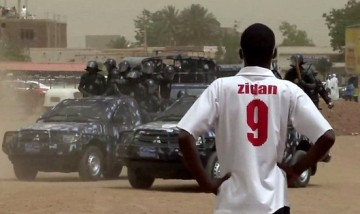Partial closure of Khartoum University as activists gear up for the “Kandaka” protest on Friday
July 12, 2012 (KHARTOUM) – The administration of the protest hit University of Khartoum (UoK) decided on Thursday to close a number of its faculties citing “the need to prepare for exams” as tension looms once again ahead of planned weekly demonstrations on Friday.

Activists told Sudan Tribune that the protesting students had bravely confronted security forces and forced them to retreat several times.
Sudan’s top university was also the birthplace of the Sudan Revolts anti-regime campaign which erupted on 16 June following the partial implementation of government austerity plans, and spread over the following weeks with protesters in the capital Khartoum and other regional towns blocking roads, burning tires and chanting slogans calling for the downfall of President Omer Al-Bashir’s regime.
Government officials including Bashir have made several comments dismissing the protests as small and refusing to equate them to the Arab Spring phenomenon which saw authoritarian regimes in the Middle East region being toppled by popular uprisings.
Some news websites reported on Thursday that the director general of the National Intelligence and Security Services (NISS), Mohammed Atta, summoned the director of UoK and ordered him to suspend study at the university indefinitely and evict students from their dorms.
The news was followed by rumors that the director of UoK was forced to tender his resignation after he explained to Atta that such a decision cannot be made without consultation with the university board which is currently unable to hold a meeting due to the unrest.
But a source representing the university’s administration told Sudan Tribune on Thursday that the news about the director’s resignation was not true.
The source who preferred anonymity revealed that the administration had decided to close a number of faculties, but he declined to specify which. He denied that the decision was due to the unrest and stressed that the current university term had “already ended and the students need to prepare for final exams”.
Meanwhile, activist groups using social media have been galvanizing support for new “day of rage” demonstrations on Friday under the name of Al-Kandaka or Candace, which refers to the title of a famous queen in the ancient Kingdom of Kush.
Activists say they chose this name to honor the struggles of Sudanese women and the sufferings they have endured under the rule of Bashir’s ruling Islamist National Congress Party (NCP).
Security authorities are expected to focus their attention and deploy heavily around mosques, especially the Abdel Raham Al-Mahdi mosque known as Wad Nubawi Mosque after the area in which it is located in Omdurman town.
Wad Nubawi mosque, which belongs to Al-Ansar religious sect that is associated with the opposition National Umma Party (NUP), was the epicentre of protests on the last two Fridays, with security forces battling hundreds of demonstrators with teargas and rubber bullets.
Al-Kandaka Friday acquires significance in light of the fact that party members of the mainstream opposition coalition National Consensus Forces (NCF), which include the NUP and the Islamist Popular Congress Party (PCP) signed on 4 July a document entitled “the Democratic Alternative” in which they agreed to work for regime change “through peaceful means” and outlined a plan for running the country in the event of NCP fall.
NUP leader Al-Sadiq al-Mahdi promised to throw his party’s weight behind the protest if opposition parties agreed on the democratic alternative issue.
In a related context, NUP’s leading member Mariam Al-Sadiq Al-Mahdi on Thursday held a press conference in Khartoum where she criticised the authorities saying they dealt in an unacceptable manner with previous demonstrations.
Mariam called on the government to give protesters their right to peaceful expression and demanded the release of detained activists.
Local human rights groups say more than 2000 people have been arrested and some have been tortured in detention since the start of the protests.
Amnesty International (AI) and Human Rights Watch (HRW), two international human rights groups, could not confirm this figure but said in a joint statement on Friday that “at least 100 people remain in detention in Khartoum alone”.
AI and HRW also accused Sudanese authorities of torturing detainees and demanded investigations into such abuses.
Mariam Al-Mahdi demanded that all detainees be released without conditions or be brought to fair trials.
Conversely, NCP spokesman Badr al-Deen Ibrahim on Thursday criticised opposition parties for attempting to use mosques as points for launching protests. Following the lead of other NCP officials, Ibrahim downplayed the protest movement saying that they do not represent the Sudanese masses.
According to Ibrahim, there are more than 5,300 mosques in Khartoum and the fact that some protesters marched out of one or two of them cannot be taken as representing millions of others in the capital.
(ST)
